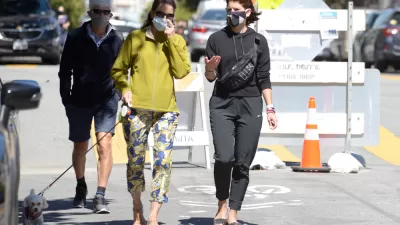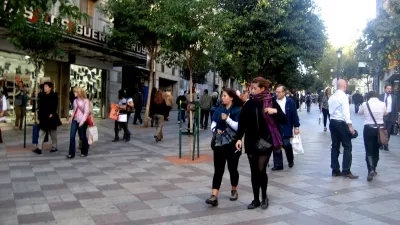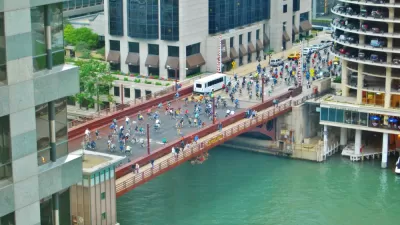Lake Street’s designation as a ‘slow street’ is overwhelmingly popular with residents. Why does the city plan to dismantle it?

Despite having support from more than 80 percent of respondents to a city survey, San Francisco officials plan to dismantle one of its remaining ‘slow streets.’ “It’s unclear why the city made this decision after it worked so hard to confirm that a clear majority of people in the area wanted to keep the street unavailable for cut-through traffic,” writes Roger Rudick in Streetsblog San Francisco.
Over the last two years, since Lake Street’s initial closure to through traffic, the city has solicited several rounds of public input, during which only a small minority objected to the closure. Yet the city is canceling plans to install concrete diverters and plans to remove existing slow street infrastructure. Advocates say the move is in blatant opposition to the city’s stated Vision Zero goals, as “traffic deaths and serious injuries in San Francisco just keep getting worse because the city signs pledges and makes promises but then backs off nearly all concrete action to make streets safer.”
In May, CBS Bay Area reported on San Francisco’s slow streets program. At that time, four of the city’s nearly 30 slow streets were approved to stay in place, including Lake St.
FULL STORY: S.F. Trashes Outreach, Kills Slow Lake St.

Alabama: Trump Terminates Settlements for Black Communities Harmed By Raw Sewage
Trump deemed the landmark civil rights agreement “illegal DEI and environmental justice policy.”

Planetizen Federal Action Tracker
A weekly monitor of how Trump’s orders and actions are impacting planners and planning in America.

The 120 Year Old Tiny Home Villages That Sheltered San Francisco’s Earthquake Refugees
More than a century ago, San Francisco mobilized to house thousands of residents displaced by the 1906 earthquake. Could their strategy offer a model for the present?

In Both Crashes and Crime, Public Transportation is Far Safer than Driving
Contrary to popular assumptions, public transportation has far lower crash and crime rates than automobile travel. For safer communities, improve and encourage transit travel.

Report: Zoning Reforms Should Complement Nashville’s Ambitious Transit Plan
Without reform, restrictive zoning codes will limit the impact of the city’s planned transit expansion and could exclude some of the residents who depend on transit the most.

Judge Orders Release of Frozen IRA, IIJA Funding
The decision is a victory for environmental groups who charged that freezing funds for critical infrastructure and disaster response programs caused “real and irreparable harm” to communities.
Urban Design for Planners 1: Software Tools
This six-course series explores essential urban design concepts using open source software and equips planners with the tools they need to participate fully in the urban design process.
Planning for Universal Design
Learn the tools for implementing Universal Design in planning regulations.
Clanton & Associates, Inc.
Jessamine County Fiscal Court
Institute for Housing and Urban Development Studies (IHS)
City of Grandview
Harvard GSD Executive Education
Toledo-Lucas County Plan Commissions
Salt Lake City
NYU Wagner Graduate School of Public Service





























